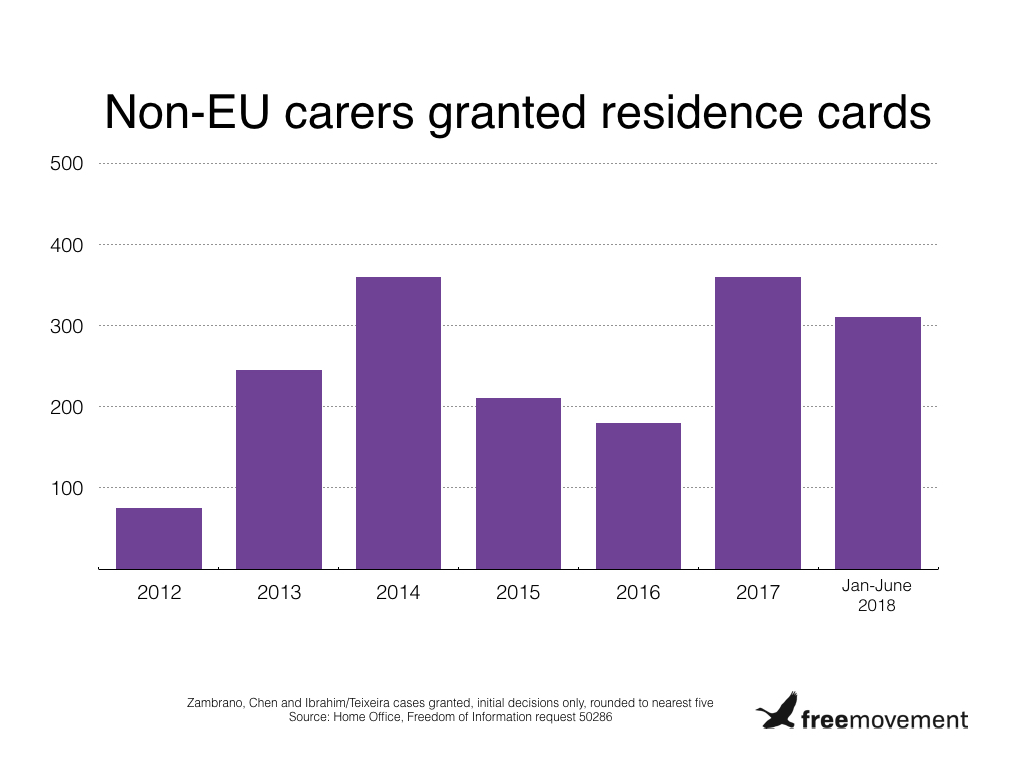- BY Colin Yeo

Only 1,700 people recognised by Home Office as Zambrano carers since 2012
THANKS FOR READING
Older content is locked

A great deal of time and effort goes into producing the information on Free Movement, become a member of Free Movement to get unlimited access to all articles, and much, much more
TAKE FREE MOVEMENT FURTHER
By becoming a member of Free Movement, you not only support the hard-work that goes into maintaining the website, but get access to premium features;
- Single login for personal use
- FREE downloads of Free Movement ebooks
- Access to all Free Movement blog content
- Access to all our online training materials
- Access to our busy forums
- Downloadable CPD certificates
Figures obtained by Free Movement show that fewer than two thousand non-EU carers rely on EU law for their right to live in the UK. The relatively small number of people relying on these “derived rights of residence” raises questions about why the government appears set to deny them settlement after Brexit — even as it prepares to settle millions of others.
Official figures released in response to a Freedom of Information request show that only 1,740 carers have been accepted as having a “derived right of residence” in the past six years. A derived right of residence allows a non-EU citizen to live in the UK because of their relationship with a child or dependant adult who without their carer would be forced to leave the country. The Home Office has said that these carers will not be able to apply to stay permanently under the EU Settlement Scheme, despite it already being designed to register around 3.6 million others who also rely on EU law to live here at the moment.
People with derived rights of residence are variously known as Zambrano carers, Chen carers or Ibrahim and Teixeira carers (after the names of the court cases establishing their rights). Home Office guidance describes the effect of the various cases as follows:
Zambrano cases
The primary carer of a British citizen child or dependent adult, where requiring the primary carer to leave the UK would force that British citizen to leave the European Economic Area (EEA).
Chen cases
The primary carer of an EEA national child who is exercising free movement rights in the UK as a self-sufficient person, where requiring the primary carer to leave the UK would prevent the EEA national child exercising those free movement rights.
Ibrahim and Teixeira cases
The child of an EEA national worker or former worker where that child is in education in the UK. The primary carer of a child of an EEA national worker or former worker where that child is in education in the UK, and where requiring the primary carer to leave the UK would prevent the child from continuing their education in the UK.
Real-world examples are the Algerian mother of two British children who flees a violent partner, the Gambian woman who is her British daughter’s only possible carer or the Rwandan citizen whose Dutch husband refuses to have anything to do with their child.
The government said in June that Chen and Ibrahim/Teixeira carers would be protected by the draft Withdrawal Agreement negotiated by the EU, and Zambrano carers allowed to remain in the UK as a matter of domestic policy. But they will not be eligible to apply under the EU Settlement Scheme and the Home Office has cast doubt on whether they will get settlement rights at all. It says only that:
…their current rights do not lead to a right of permanent residence under EU law, but further details will be provided in due course on the new status available to them.
The new figures show that only 1,740 people have been recognised as having a derived right of residence between 1 January 2012 and 30 June 2018. The real figure of actual derived rights of residence holders could potentially be higher, as the data does not cover all residence cards issued, only “cases granted”. Residence cards issued after reconsiderations and reviews are excluded.
| Derived right of residence, cases granted | |
| 2012 | 75 |
| 2013 | 245 |
| 2014 | 360 |
| 2015 | 210 |
| 2016 | 180 |
| 2017 | 360 |
| Jan-June 2018 | 310 |
| Source: Home Office, FOI 50286. Note: figures cover initial decisions to grant a residence card only, excluding reconsiderations and reviews, and are rounded to nearest five. | |
The figures also show that 310 people were accepted as having a derived right of residence in the first six months of 2018 — about as many as in the whole of 2017. That may indicate a rise in applications for derived right residence cards in the run-up to Brexit.
Nevertheless, the numbers are small. The EU Settlement Scheme will allow up to 3.5 million EU citizens to settle in the UK permanently, and another 130,000 of their non-EU relatives. Allowing maybe two thousand more carers to join them seems unlikely to cause undue political or logistical difficulty.

SHARE


One Response
Hi. I think the surge in applications might be also caused by the right to rent (Immigration Act 2014&2016)? Without any paperwork from the Home Office non-EEA nationals are excluded from the private rented sector. Acquiring rights by operation of law is not enough when landlords are required to ask for copies of HO documents before granting a tenancy or even allowing that person to reside in the property as a non-tenant adult occupier…